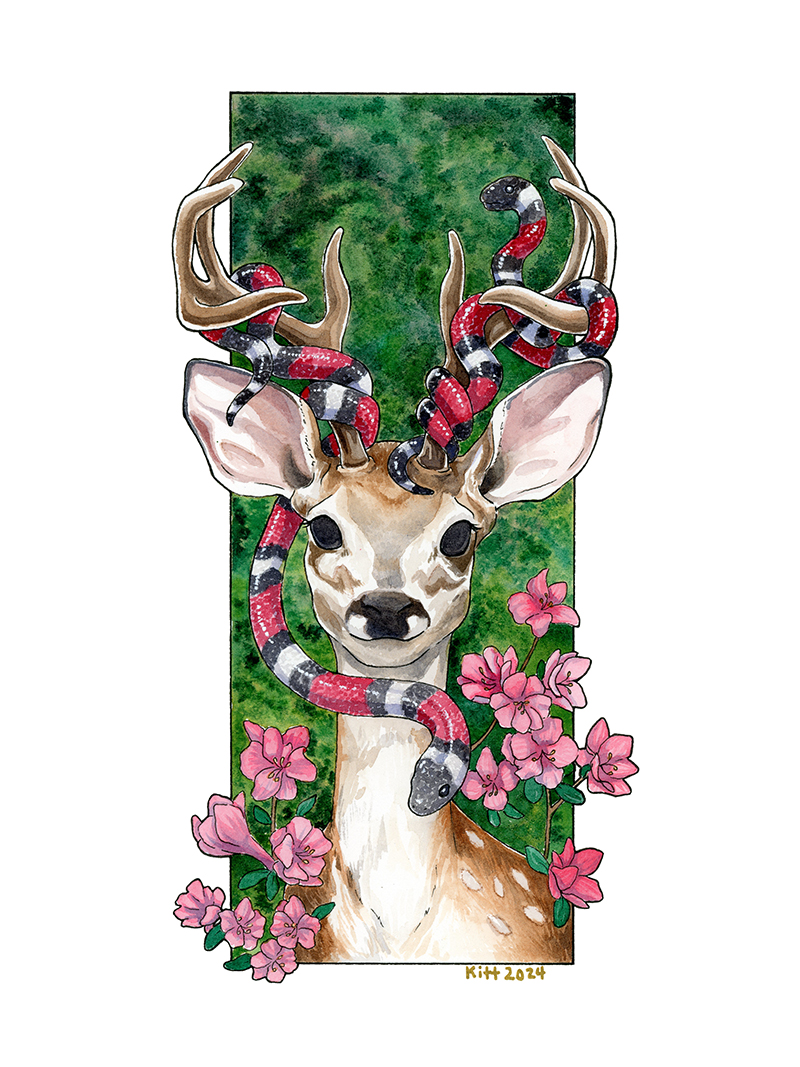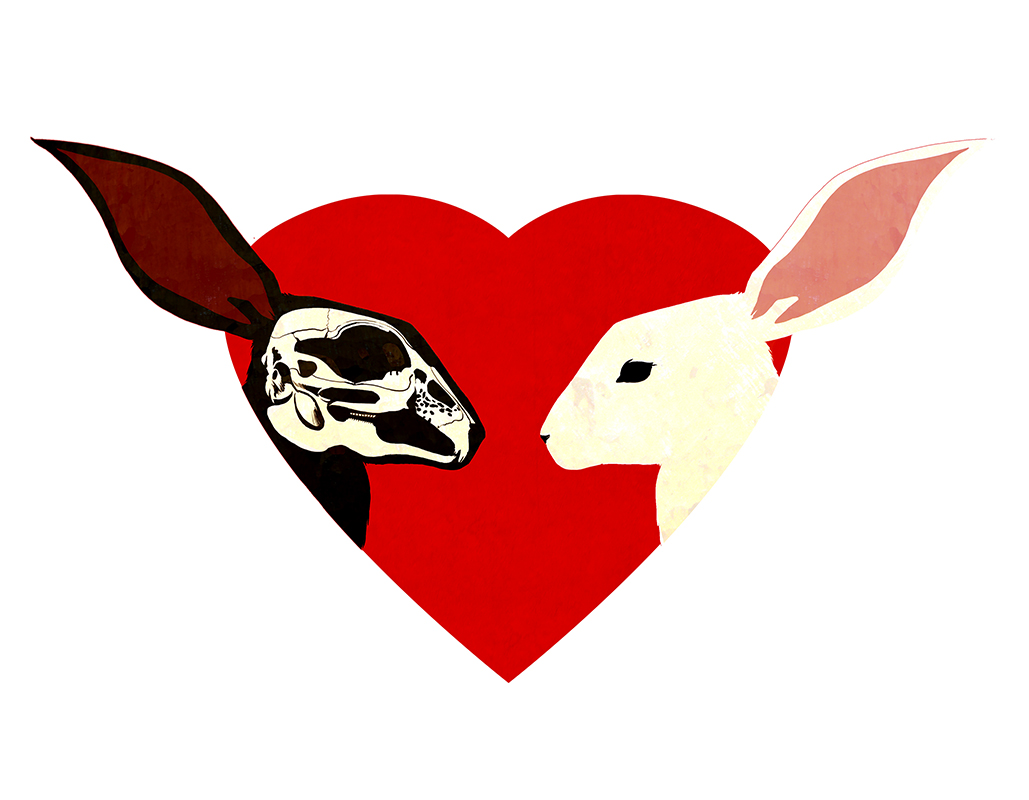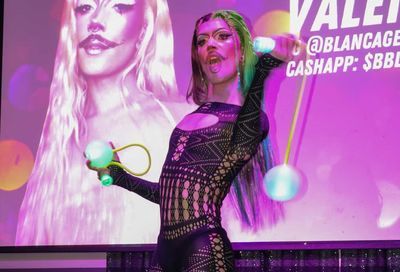Life Lines
Interview with Comic Book Artist Michael-Christopher
Photography by Todd Franson
Three months ago, lying on a path alongside the George Washington Parkway with a broken arm, many thoughts were rushing through Michael-Christopher’s head. They weren’t about the pain from the rollerblading accident.
“I had a comic to do, a novel in production, a Love for Literature tour I was putting together, some AIDS prevention projects I was doing for AIDS Atlanta, all these things,” he says. “I was like, ‘Oh, Jesus, this is the worst time for this to happen.’
“And I had a rental car I had to get back in a couple of hours.”
 |
In the weeks since, his arm has healed and Michael-Christopher is back working full-steam ahead on his signature series, Living the Life. Through six issues of his comic book story about gay black men in New York, a growing base of fans have followed the ongoing adventures of Hank, Kurtis and Andre on their quests for love and happiness. More recently, Michael expanded the series with novels that tell the stories of his main characters in the days before the comics started.
Fresh off his thirty-sixth birthday, and with a newly healed arm, Michael is back in full swing promoting his latest Living the Life novel, as well as working on the next installment of the comic. A freelance graphic designer and illustrator, Michael self-publishes his series through his own company, Michael-Christopher Books. His efforts included the successful Love for Literature event in April, a book festival and reading by black gay authors at The Edge, which Michael plans to soon reprise.
It’s not the kind of life you get by staying inside the lines.
“I kind of have this attitude of the sky’s the limit,” he says. “Whatever you can do, do it.”
Metro Weekly: When did the first Living the Life come out?
Michael-Christopher: The first comic was available April 15, 1998. It was just something that I did while I was between jobs in New York. I had been laid off, actually, so it gave me a little more time and I thought, “I’m going to do a comic book about gay black men.” When I went to the school of visual arts, we were doing a lot of superhero stuff. I like the superheroes, and I like drawing big muscle guys, which I get a lot of flak for. But I wanted to do something more true to my life. [During] the first year, I took the book on the road to prides and conferences and tried to sell it. Of course, the folks who bought it really wanted to know what was happening next.
MW: I guess that gave you the impetus to go ahead with the second issue.
Michael: I definitely wanted to do something to make them want more. I have a little marketing experience. [Laughs.] I made the end of the first one kind of a cliffhanger. Everybody wanted to know more — were Hank and Curtis getting together, what’s going to happen with Andre? People would ask me all these questions, it was starting a buzz. All the issues end with something big happening that keeps folks interested.
MW: It’s a little like a soap opera in a comic book form.
Michael: It’s been referred to as the black Queer as Folk meets Sex and the City, but actually I came first so I think they’re more an incarnation of Living the Life. [Laughs.] But I’m glad that people are comparing it to other things and keeping that buzz.
MW: How do you describe the series for someone who’s never heard of it before?
Michael: I encapsulate it as a comic about brothers loving brothers. I don’t really get hung up on the whole label thing. I would like for straight people to read it, and blacks, whites, Hispanics and Asians. They’ve got to know that it’s a same-gender loving thing going on, but I don’t want them to be afraid of it. I want everybody to relate to it.
MW: In the title Living the Life, what does the “life” refer to?
Michael: Well, it’s not based on my life, the story lines aren’t directly pulled from my diary or anything like that. It’s more about my life in New York and some of the things I encountered. I wanted to tell a kind of common gay black man’s story. At the time, you had the b-boy thing going on, and that wasn’t really my experience. Then you had super high-powered, rich black business people and professionals — I was almost on my way to being a buppie, I guess, but not where I could fly across the country at a whim. I just wanted to focus on the regular Joe, and get that connection with people. Especially with the novels, people are telling me they relate to the characters in ways that I didn’t even expect. It’s getting more of a response than I even thought it would.
MW: Looking at graphic novels and comics that are out there now, do you have any favorites?
Michael: I can’t even remember half of the artists’ names anymore, because I haven’t been buying comics as much as I would like to. But the things they’re doing now on the computer, the effects and the coloring, I think are some of the most impressive things. When I was in school, we learned a lot about inking and cross-hatching — now they don’t even do that. They have color so detailed now that it almost looks like a photograph when they’re done. The cross-hatching and all that stuff would just get in the way. Now if you look at an instrument panel on a ship, the buttons look like they’re glowing. Back in the day you had to draw the little light rays coming from it. [Laughs.]
MW: Do you do any of your work with computers?
Michael: Oh, yeah. I do what they do, basically. I draw from pencil first, and then I ink it, and then I scan the art and go into the computer to color — it’s not in color, it’s black and white, but I paint it with gray. I’ve gotten more detailed with that.
 |
MW: As an illustrator creating graphic novels, what led you to branch out into writing novels as part of the series?
Michael: Unfortunately, when people see a certain thing that they haven’t really experienced much in their life it can intimidate them. I find comics really intimidate adults who haven’t read them as children. They’re like, “I don’t read comics.” Not everybody is into the superhero thing. For me, comics are as valid as magazines or novels or television –it’s just another form of media to me. So I had to figure out a way to reach the non-comic-reading people.
I always develop my characters, even as a cartoonist. I don’t always reveal everything in the book, because the reader doesn’t necessarily have to know everything, but I need to know where a character is coming from. I didn’t realize how much writing I was doing, because I was thinking about the pictures. I discovered that I was a writer. So I said let me try and write a novel, and draw these people into the comic from the novel. The novels are prequels to the comic magazine. All the prequels end the same day the comic starts. The stories in the novels are self-contained — you could read one prequel and not read the other. But if you want to know what happens after, you can pick up the comics.
MW: How has that new direction been going for you?
Michael: I’ve been getting a lot of good response. I’m surprised, really, that someone hasn’t picked it all apart and said, “this is frivolous trash” or anything like that. [Laughs.] But no one’s ever said anything negative. It’s almost scary, because you always hear folks say negative comments about everything. Maybe people don’t want to hurt my feelings. Or maybe they do like it.
MW: As you continue Living the Life, are you going to mix up the progression of the story as both comics and novels?
Michael: No, that would just be writer’s hell. If I did that I’d have to really think that out. The first two prequels were pretty easy. There’s one scene that’s in both novels, and it’s pretty much the same dialogue, but there’s some added things also. That scene is going to be in the third prequel for Andre, as well. And I knew I was going to do this, but I didn’t plan it out as much as I probably should have. I have to see how it goes, but it’s going to be tough to weave it all in there. But I think I can work it out.
MW: From the first issue to the most recent, your style as an artist seems to have changed in some ways. Is that a conscious change, or something that has grown out of being more comfortable with the characters?
Michael: It’s been a couple of things. I had a lot of time to do the first issue — I had no schedule and no job, so I got really detailed on it. Later on, I got more comfortable. It was hard for me at first to make the characters look the same from one panel to another, because I wasn’t used to them yet. But then I put out three books in one year. It’s been a while since the last one because three months ago I broke my arm and I just couldn’t produce a comic because I had a sling and a brace. Luckily I was able to finish the prequel for Curtis. I had some people come in and help me with corrections, because even working on the computer was rough.
MW: How did you break your arm?
Michael: I was rollerblading and I wasn’t used to the trails. I was coming down a steep part really fast, faster than I thought I was. I felt the blades getting unstable and I didn’t want to roll because I didn’t have a helmet on and I knew that would just mess me up all over, knees, back, everything. I saw this chain link fence with rubber on it, so I [used it to stop]. But I held my arm out because I didn’t want to go into it face-first, and my arm just snapped.
MW: Do you still rollerblade?
Michael: I haven’t been back yet, but I will eventually when I’m a hundred percent. If you get in a car accident you don’t stop driving. People react like rollerblading is bungee jumping or something. I’m like, it’s skating for God’s sake, I’m not in a roller derby or anything.
MW: Do you work for yourself full-time?
Michael: I don’t want to say I’m a graphic designer first, because I’m not really doing that much of that now, but I’m a freelance graphic designer and illustrator. And the publisher of Michael-Christopher Books, you know that comes in there too.
MW: When was the last time you worked as an employee for someone else?
Michael: That was June of 2000, in New York.
MW: Do you miss it?
Michael: I miss the steady paycheck. I can have a really nice contract with somebody but with all the red tape and paperwork and I might be on my last penny before I get a check. I don’t miss the office politics, I don’t miss having to get up early and get to work by nine, and all of that stuff. But then I do miss having other employees — there’s no Christmas party here, there’s no hanging out at the water cooler. Sometimes the solitude can get to you, but it’s still good.
 |
MW: You’ve been a self-publishing success story. How hard was it to get into bookstores, particularly gay bookstores?
Michael: It was actually pretty easy. The trick is staying in the bookstores. I have personal relationships at Lambda Rising [and other stores], so when they run out of my books they’ll call me. But because I don’t have that face-to-face recognition with bookstores across the country I have to call up folks around the country and remind them to reorder. The books aren’t coming back to me, so I know they’ve sold, but they might not be so familiar with the title because they don’t know me — it’s just Michael-Christopher Books, not Harper Collins. I have to do a lot of stuff to remind folks around the country. But now I’m actually I’m talking to an agent in New York.
MW: Would that mean giving up things that you like about self-publishing?
Michael: I like having control. I like being able to design my own book cover. But when you self-publish, you’re never finished doing anything. There’s always something that you should be doing or could be doing to further promote yourself.
MW: How different is your life at 36 from what you expected it to be when you were 21?
Michael: I guess I didn’t expect to have to make so many sacrifices at this age. When I was in New York working a full-time job making a secure $47,000 a year, I expected to just go up. But now that I’ve thrown that away, I have to make a lot of sacrifices. I wanted a house and a car by 36. Having moved here, I thought it would be a little easier than the New York area, but when I moved here it seems like I brought all the New York prices with me and then some. It’s definitely a better quality of life, though, which is really why I moved.
MW: When did you come out?
Michael: I was 21. I’d just brought a guy who I was seeing over to the house, but I didn’t introduce him as my boyfriend. The next day, another friend of mine sent me flowers because I had told him I never got flowers — so my friend sent them, it just so happened, on the day after this guy comes and meets my mom. She just knew that they were from him, but she was wrong. But it prompted a whole bunch of questions, and she ended up asking me if was I straight, and I told her no. Then she kind of went crazy for a minute. After a few months things died down and she was really cool with it. Her and my dad were just so supportive — it’s a non-issue. But my brother and sister, they’re funny. I thought it was going to be opposite. My sister and my brother and I grew up very closely. But they’re not too thrilled about it. [Laughs.]
MW: Now that you’ve been here for three years after so many years of the New York scene, how are things different with D.C.’s black gay community?
Michael: I think people are a lot more social here. When I talk to my friends in New York and ask them what’s going on, nobody knows. They’re like, “If you find out, tell me.” In D.C. you know where to go, and there’s new things popping up every so often. It just seems like things in the black gay community in New York are sort of petering out. It seems like there’s no energy. You know how sometimes the DJ will turn down the music for a second and the crowd is supposed to go Yay! — now all you hear is feet shuffling. It’s really sad. I don’t know if 9/11 has got everybody bummed out or what. I’m so glad I wasn’t there then. I live five miles from the Pentagon, I could see the smoke from right here, but I don’t think that affected us as much as things have affected folks in New York. It was a lot more to deal with there.
Michael-Christopher signs books from his comic and novel series Living the Life, on Thursday, July 31, at 7 p.m. at Lambda Rising, 1625 Connecticut Ave. NW. For more information on Michael-Christopher Books visit www.livedlife.com.
Advertisement
|
Support Metro Weekly’s Journalism
These are challenging times for news organizations. And yet it’s crucial we stay active and provide vital resources and information to both our local readers and the world. So won’t you please take a moment and consider supporting Metro Weekly with a membership? For as little as $5 a month, you can help ensure Metro Weekly magazine and MetroWeekly.com remain free, viable resources as we provide the best, most diverse, culturally-resonant LGBTQ coverage in both the D.C. region and around the world. Memberships come with exclusive perks and discounts, your own personal digital delivery of each week’s magazine (and an archive), access to our Member's Lounge when it launches this fall, and exclusive members-only items like Metro Weekly Membership Mugs and Tote Bags! Check out all our membership levels here and please join us today!



























